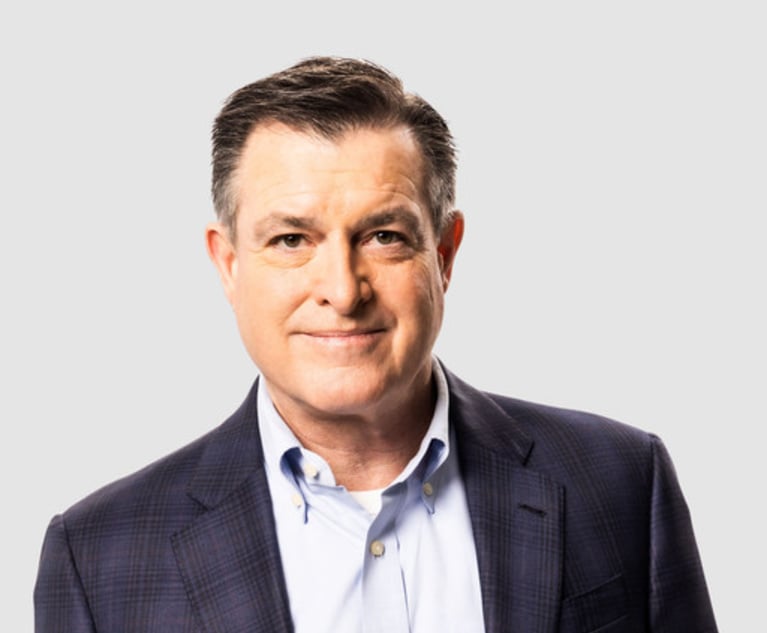Cyber Experts: Law Firm Info Security Is Not Just IT's Problem
"Everyone in your firm should be thinking about information security; it needs to be integrated into the culture," said Jill Rhodes of Option Care.
August 12, 2019 at 02:52 PM
4 minute read
 Standing onstage earlier this month, Jill Rhodes, vice president and chief information security officer, Option Care Enterprises, speaks as part of a panel discussion called “Law Firm Cybersecurity Requirements You Never Dreamed of, Emerging Threats, Ethical Obligations to Clients, and Survival Tactics.” (Photo: Jason Doiy/ALM)
Standing onstage earlier this month, Jill Rhodes, vice president and chief information security officer, Option Care Enterprises, speaks as part of a panel discussion called “Law Firm Cybersecurity Requirements You Never Dreamed of, Emerging Threats, Ethical Obligations to Clients, and Survival Tactics.” (Photo: Jason Doiy/ALM)
Cybersecurity experts had a sobering message for the audience at a recent American Bar Association panel discussion: Preventing malicious cyberattacks is an obligation that falls on lawyers, if they want to protect their clients’ information.
The panel, as part of the American Bar Association Annual Meeting in San Francisco on Aug. 9, discussed the threats of cybersecurity breaches at law firms. The session was moderated by ABA Cybersecurity Legal Task Force co-chair Ruth Hill Bro and included Option Care vice president and chief information security officer Jill Rhodes, Adams and Reese partner Lucian Pera and Silicon Valley Law Group shareholder Stephen Wu.
“The bottom line is, it starts with you,” Rhodes said. “Everyone in your firm should be thinking about information security; it needs to be integrated into the culture. We have to understand and prioritize the risk.”
She said law firms should constantly be asking themselves: “Where is our data, where is the risk that data is bringing in, how are we protecting that data?”
Listing a number of data breaches at major companies in recent years—including Uber, Equifax, Marriott and Facebook—Rhodes emphasized the massive impact of a cyber breach, explaining that the lessons learned from the breaches apply to all businesses, including law firms.
Rhodes said she believes 75% of data breaches are not caused by technology malfunctioning, but the mishandling of the information from the company and employees. She urged businesses to think about cybersecurity at the company governance level, advising employees to guard their client information with more care.
Because law firms often operate as a repository of sensitive client information, they have increasingly become prime targets for cybersecurity attacks. But law firms are relatively unprepared for continually emerging threats, according to the panelists.
“My view is that all of us as lawyers—we don’t care if you are solo or if you’re with some thousand-lawyer megafirm … you’ve got the personal obligation to have some clue how to deal with these issues and some level of understanding of ethical obligations,” said Pera, the past chair of the governing board of the ABA Center for Professional Responsibility.
“You’ve got to also have some understanding of every piece of technology that you use,” he added.
In the past two years, the Center for Professional Responsibility has issued Formal Opinions 477R, 482 and 483 that outline lawyers’ ethical obligations to combat cyberattacks. In addition, ABA Model Rule of Professional Conduct 1.1 also states a lawyer “should keep abreast of changes in the law and its practice, including the benefits and risks associated with relevant technology.”
Pera said ethics rules “require” lawyers to be able to get help with security concerns. “If you don’t have on your cellphone—maybe in your wallet, if you are old school—the phone number of the person you’re gonna call if your laptop gets stolen … then you have a problem,” he added.
As the storage of information has moved from paper-based to computers, and now to the cloud, Wu, a Silicon Valley-based lawyer, said he has observed: “Accessibility of information has expanded exponentially.”
“So, when we’re trying to protect client confidentiality, now we have to think about who has access to that information, from what device and how? And through what network?” Wu said. “It literally could be anywhere in the world.”
Clients also are imposing cybersecurity requirements on their law firms, Bro added, noting her company will conduct questionnaires and technology assessments to determine if their outside counsel take property management to protect client data.
“We assess all of the firms,” she said. “We work with several different firms in my company, we go out to assess all of them.”
This content has been archived. It is available through our partners, LexisNexis® and Bloomberg Law.
To view this content, please continue to their sites.
Not a Lexis Subscriber?
Subscribe Now
Not a Bloomberg Law Subscriber?
Subscribe Now
NOT FOR REPRINT
© 2025 ALM Global, LLC, All Rights Reserved. Request academic re-use from www.copyright.com. All other uses, submit a request to [email protected]. For more information visit Asset & Logo Licensing.
You Might Like
View All
Prepare Your Entries! The California Legal Awards Have a New, February Deadline
2 minute read
California Legal Awards Moving to Mid-Summer Date in 2025, Adds New Categories
2 minute read
'You Can’t Do a First Draft of Common Sense': Microsoft GC Jon Palmer Talks AI, Litigation, and Leadership

Shareholder Activists Poised to Pounce in 2025. Is Your Board Ready?
Trending Stories
- 1Public Notices/Calendars
- 2Wednesday Newspaper
- 3Decision of the Day: Qui Tam Relators Do Not Plausibly Claim Firm Avoided Tax Obligations Through Visa Applications, Circuit Finds
- 4Judicial Ethics Opinion 24-116
- 5Big Law Firms Sheppard Mullin, Morgan Lewis and Baker Botts Add Partners in Houston
Who Got The Work
J. Brugh Lower of Gibbons has entered an appearance for industrial equipment supplier Devco Corporation in a pending trademark infringement lawsuit. The suit, accusing the defendant of selling knock-off Graco products, was filed Dec. 18 in New Jersey District Court by Rivkin Radler on behalf of Graco Inc. and Graco Minnesota. The case, assigned to U.S. District Judge Zahid N. Quraishi, is 3:24-cv-11294, Graco Inc. et al v. Devco Corporation.
Who Got The Work
Rebecca Maller-Stein and Kent A. Yalowitz of Arnold & Porter Kaye Scholer have entered their appearances for Hanaco Venture Capital and its executives, Lior Prosor and David Frankel, in a pending securities lawsuit. The action, filed on Dec. 24 in New York Southern District Court by Zell, Aron & Co. on behalf of Goldeneye Advisors, accuses the defendants of negligently and fraudulently managing the plaintiff's $1 million investment. The case, assigned to U.S. District Judge Vernon S. Broderick, is 1:24-cv-09918, Goldeneye Advisors, LLC v. Hanaco Venture Capital, Ltd. et al.
Who Got The Work
Attorneys from A&O Shearman has stepped in as defense counsel for Toronto-Dominion Bank and other defendants in a pending securities class action. The suit, filed Dec. 11 in New York Southern District Court by Bleichmar Fonti & Auld, accuses the defendants of concealing the bank's 'pervasive' deficiencies in regards to its compliance with the Bank Secrecy Act and the quality of its anti-money laundering controls. The case, assigned to U.S. District Judge Arun Subramanian, is 1:24-cv-09445, Gonzalez v. The Toronto-Dominion Bank et al.
Who Got The Work
Crown Castle International, a Pennsylvania company providing shared communications infrastructure, has turned to Luke D. Wolf of Gordon Rees Scully Mansukhani to fend off a pending breach-of-contract lawsuit. The court action, filed Nov. 25 in Michigan Eastern District Court by Hooper Hathaway PC on behalf of The Town Residences LLC, accuses Crown Castle of failing to transfer approximately $30,000 in utility payments from T-Mobile in breach of a roof-top lease and assignment agreement. The case, assigned to U.S. District Judge Susan K. Declercq, is 2:24-cv-13131, The Town Residences LLC v. T-Mobile US, Inc. et al.
Who Got The Work
Wilfred P. Coronato and Daniel M. Schwartz of McCarter & English have stepped in as defense counsel to Electrolux Home Products Inc. in a pending product liability lawsuit. The court action, filed Nov. 26 in New York Eastern District Court by Poulos Lopiccolo PC and Nagel Rice LLP on behalf of David Stern, alleges that the defendant's refrigerators’ drawers and shelving repeatedly break and fall apart within months after purchase. The case, assigned to U.S. District Judge Joan M. Azrack, is 2:24-cv-08204, Stern v. Electrolux Home Products, Inc.
Featured Firms
Law Offices of Gary Martin Hays & Associates, P.C.
(470) 294-1674
Law Offices of Mark E. Salomone
(857) 444-6468
Smith & Hassler
(713) 739-1250






